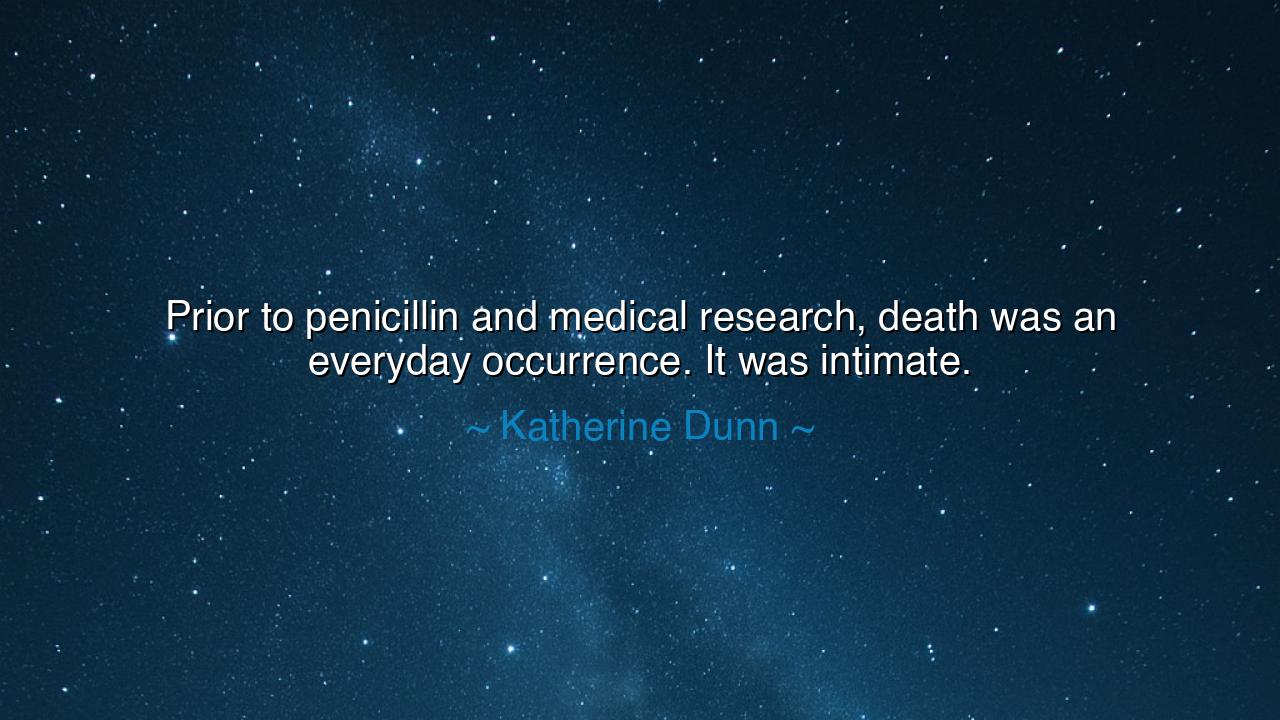
Prior to penicillin and medical research, death was an everyday
Prior to penicillin and medical research, death was an everyday occurrence. It was intimate.






In the words of Katherine Dunn, "Prior to penicillin and medical research, death was an everyday occurrence. It was intimate." These words are a poignant reflection on the fragility of life and the profound shift that occurred with the advent of modern medicine. Death, once a close and ever-present companion, was something that everyone, regardless of their station in life, had to face. In ancient times, death was not a distant or abstract concept but a familiar and inevitable part of existence, often arriving without warning or mercy. It was not sanitized or hidden away in hospitals or clinical settings, but lived alongside people, affecting families, communities, and entire societies with its immediacy.
The ancients understood death in a way that modern society has largely forgotten. In Greek philosophy, Socrates spoke of death with a calm acceptance, viewing it not as something to be feared but as an integral part of the natural cycle of life. In his final moments, when given the opportunity to escape death, Socrates chose instead to embrace it, teaching his disciples that death was a transition, not an end. Similarly, in Rome, the stoic philosophers like Seneca and Marcus Aurelius viewed death as something to be prepared for, for it was as certain as life itself. They taught that to live a virtuous life meant to live in full awareness of one’s own mortality. Dunn's words remind us of this ancient wisdom, for in the days before modern medicine, death was ever-present, and people did not shy away from its inevitability.
Consider the life of Pliny the Elder, a Roman scholar who met his death during the eruption of Mount Vesuvius in 79 AD. His response to the eruption was not one of fear but of curiosity, as he sought to understand the disaster unfolding before him. Pliny’s death was sudden and intimate, a reflection of the ancient world’s acceptance of the fragility of life. In his final moments, he did not retreat from death but faced it head-on, much as people did before the advent of modern medicine. In this ancient understanding, death was neither sanitized nor distant—it was part of the very fabric of human existence.
Before the age of penicillin and other medical advancements, people had no choice but to confront death regularly. Plagues, wars, and diseases took countless lives, and the knowledge of medicine was limited and often ineffective. Hippocrates, the father of modern medicine, worked within a world that did not have the tools to prevent death as we know it today. His belief in the power of observation and understanding the body was revolutionary, but it could not yet save lives from the diseases that cut them short. Dunn's words capture the intimacy of this experience—the closeness people once had with death, seeing it not as a medical issue but as a constant, inescapable part of life.
As medical research and the development of antibiotics like penicillin began to emerge, the landscape of human existence changed. Diseases that once claimed the lives of countless individuals were now treatable. Plagues were reduced, and many ailments that once caused premature death were no longer fatal. Modern medicine has granted humanity an extension of life that was unimaginable to those who lived in earlier centuries. What once was an intimate companion, ever at the door, is now a distant threat that can often be pushed away by modern advancements. This shift has changed the way we live and the way we view our own mortality.
However, Dunn’s reflection challenges us to reconsider the distance we have created from death. In modern society, death is often hidden away in hospitals and nursing homes, made clinical and impersonal. People no longer confront the reality of death as they once did. The intimacy of death, once woven into the fabric of daily life, has become something that is feared, avoided, and sanitized. While modern medicine has certainly brought great advances, Dunn’s words remind us of the humanity that comes with facing death. It is through this awareness of our mortality that we can live more fully, appreciating the preciousness of life and the connections we share with one another.
The lesson we can draw from this is one of balance. While medical advancements have granted us the gift of life and health, we must not forget the intimacy of death, as the ancients understood it. To live fully is to accept our mortality, to know that life is fleeting and therefore must be lived with purpose and meaning. Let us approach our days with gratitude, cherishing each moment as a gift. Dunn’s words invite us to reflect on the full circle of existence, where life and death are not enemies but partners in the great dance of human experience. May we, like the ancients, embrace both, living with the wisdom of our inevitable end and the joy of the moments we are granted.






AAdministratorAdministrator
Welcome, honored guests. Please leave a comment, we will respond soon